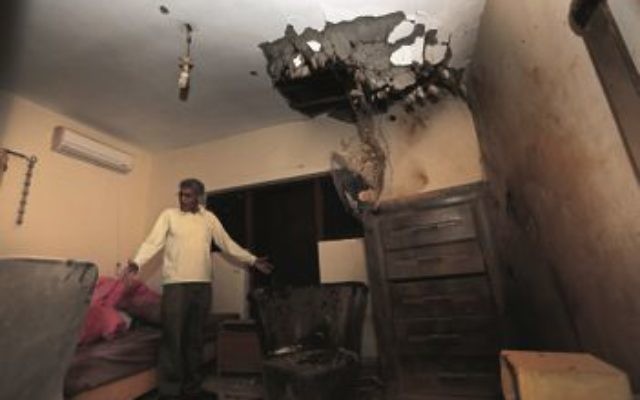Israel defends its borders
THERE was misery in southern Israel this week as thousands of residents hunkered down in bomb shelters while 123 terrorist rockets rained down on the region.
“It has felt terrible, people have been very worried,” Danny Dahan, chairman of the Sderot Chamber of Commerce, told The AJN. “It has been a bit different to in the past, as people are starting to lose hope.”
He reported a fear that the region is returning to a period of intense rocket fire, similar to that which existed before Operation Cast Lead ended in early 2009. “People are worried they are returning to a more difficult time, and understand that there isn’t a solution to the problem.”
The violence around the Gaza-Israel border coincided with the breaching of Israel’s border with Syria. A mortar shell from Syria hit an Israeli military post in the Golan Heights on Sunday, apparently a spillover from internal fighting in Syria. After showing restraint when several Syrian shells landed in recent weeks, and after three Syrian tanks entered a demilitarised zone in the Golan on November 3, Israel responded by firing a warning shot at Syria. It was the first time it had fired in this direction since the Yom Kippur War of 1973.
On Monday, another Syrian mortar landed in the Golan, this time near a town. Israel fired back, this time targeting – and hitting – Syrian mobile artillery. Israel has long feared that internal fighting in Syria could spill over to Israel. “This is a Syrian issue that could become our issue,” Chief of Staff Benny Gantz said when touring the Golan earlier this month. Israel has complained to the UN about the border violations.
President Shimon Peres commented regarding Syria: “First of all, as a human being I deeply regret the bloodshed, children being killed by their own government is unacceptable, there are moral principles. We are not involved in what’s going on in Syria and we have no intention to intervene in what is a terrible and sad story. But if they try to shoot at us we shall defend ourselves. We will be considered, we will analyse every event, but we shall defend ourselves.”
On the Israel-Gaza border, the escalation began on Saturday, when militants fired an anti-tank missile into Israel. It scored a direct hit, injuring four Israeli soldiers. Yoav Mordechai, spokesperson for the Israeli military, called the attack “very serious”. Intense fighting followed, with rocket fire from Gaza interspersed with 13 Israeli Air Force strikes on terror targets in Gaza. All strikes resulted in direct hits.
The rockets injured four Israeli civilians and damaged several homes. Palestinian media claimed three fighters and four civilians were killed in Gaza, and 40 people were wounded. Israel regrets hurting civilians in Gaza, but takes the view that terrorists are to blame for intentionally operating from among civilians and using them for cover.
Calm seemed to return to the Gaza-Israel border on Tuesday, after militants from various factions declared a ceasefire at a meeting called by Hamas. It appeared that tough talk from Israeli politicians, intimating that they were considering a repeat of Operation Cast Lead, caused them to reign in their attacks. Several high-profile politicians were also calling for Israel to carry out targeted assassinations of Hamas leaders.
Shortly before the militants declared their ceasefire, Israel convened a meeting of foreign ambassadors, in what was widely seen as a move to prepare international opinion for a large-scale offensive in Gaza. Prime Minister Benjamin Netanyahu told them Israel was “going to fight for the rights of our people to defend themselves”.
He elaborated: “We’ll take whatever action is necessary to put a stop to this. This is not merely our right, it’s also our duty, and it’s something that I think is understood not only by you, who are here in Ashkelon today, but by any fair-minded person in any fair-minded government in the world – they would understand that it’s our right to defend our people, and this is what we shall do.”
Speaking of the large numbers of Israelis who are subject to attacks from Gaza, Netanyahu said: “I don’t know of any of your governments who could accept such a thing. I don’t know of any of the citizens of your cities who could find that acceptable and something that could proceed on a normal basis. I think the whole world understands that this is not acceptable. It’s something that the people of Israel can’t accept and it’s something that I, as the Prime Minister of Israel, I cannot accept it.”
After recent escalations, Israel has held back its operations against militants once the flow of rockets has ended. But this time, once calm returned, there were indications that Israel may still respond forcefully. “The event is not yet over,” said Defence Minister Ehud Barak on Tuesday.
He continued: “Hamas and the other terrorist organisations are suffering as a result of intense strikes [by the Israeli military] in Gaza. But it is certainly not over and we will decide how and when to act if necessary. I do not want to address either timing or means [of operation]; it would not be right to provide this information to the other side.
“We do not intend to allow – in any shape or form – the continued harming of the day-to-day life of our citizens. And we intend to reinforce the deterrence – and strengthen it – so that we are able to operate along the length of the border fence in a way that will ensure the security of all our soldiers who are serving around the Gaza Strip.”
The office of UN Secretary-General Ban Ki-moon released a statement saying that he “reiterates his call for an immediate cessation of indiscriminate rocket attacks by Palestinian militants targeting Israel and strongly condemns these actions”. He called for Israel “to exercise maximum restraint” and for both sides to “do everything to avoid further escalation”.
NATHAN JEFFAY


comments